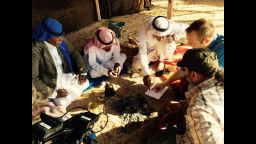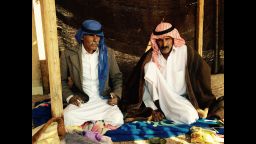Story highlights
Tribal leaders say they have stopped ISIS without firing a shot
"They are not Muslims," Bedouin leader Sulieman El Meharwel says
ISIS is active in northern Sinai but has not been able to push south
The Sinai Peninsula is the new front line in the battle against ISIS.
But the men defending Sinai aren’t soldiers or police. They are Bedouin tribe members, who say they have stopped the terror group without firing a shot.
“They are not Muslims,” says Sulieman El Meharwel, one of three tribal leaders who talked to CNN about resisting ISIS. “They kill anyone who doesn’t agree with them. We accept everyone, including Christians and Jews, but we can never accept ISIS.”
It’s the Egyptian wing of ISIS that claims to have downed Metrojet Flight 9268 over Sinai, killing all 224 people aboard.
El Meharwel, of the Mesaied tribe, sits in a wooden shack with palm branch roof, down a bumpy dirt road surrounded by jagged peaks.

A pot of tea brews over a fire as El Meharwel, Hussein Abu Atwey and Sulieman Abu Swailam of the Huwaitat tribe draw a map of Sinai in the sand.
They show where ISIS is operating in the north.
The Bedouin leaders say ISIS has tried to push south multiple times to fight its guerrilla war against the Egyptian government but has never succeeded.
“We’ve stopped ISIS more than 20 times. We went out with more than 50 cars and kicked them back,” says Abu Atwey, of the Tarabeen tribe. “We told them they aren’t allowed in our territory. We didn’t shoot one bullet because if there was one bullet shot, there would be a (tribal) war.”
“ISIS is scared because we are united. They were scared of us. If we didn’t wear our guns, they wouldn’t be afraid. We had enough guns and we forced them back,” Abu Atwey says. “The army told us, ‘Everyone get your gun out if they try to come into your area.’ “
How ISIS in Sinai was born
The Bedouins describe ISIS in Sinai as a “cocktail” of some local Bedouins, Egyptians from the Nile Valley, Palestinians from neighboring Gaza and other foreigners.
The roots of the group that has become the Egyptian wing of ISIS dates back to 2011, after the revolution that toppled longtime President Hosni Mubarak.
The militant group Ansar Beit Al Maqdis started to take hold of parts of northern Sinai. Its message appealed to some of the region’s disenfranchised youths while capitalizing on the marginalization of the local Bedouin community.
The group then flourished under the lax security and more tolerant attitude of President Mohamed Morsy, who hails from the Muslim Brotherhood.
It was after the 2013 ousting of Morsy by the army that ABM ramped up its wave of terror by killing hundreds of people, including soldiers, policemen and civilians. Then in November 2014, ABM pledged allegiance to ISIS leader Abu Bakr al-Baghdadi, and Wilayat Sinai, the State of Sinai, was born.
ISIS acquired weapons smuggled from the failed state of neighboring Libya. The terrorists deploy a range of tactics, including suicide bombers, improvised explosive devices, drive-by-shootings, and anti-tank and anti-aircraft missiles.
Uneasy allies against ISIS
The army says its campaign against the militants in northern Sinai is succeeding and has killed hundreds of fighters.
But the sheikhs say that the army’s use of heavy-handed tactics in fighting ISIS in the north has made local Bedouins reluctant to help either side.

The central government in Cairo views the nomads with suspicion and questions their loyalty to the state. The Bedouins complain of being discriminated against and marginalized by the central government.
Rights groups accuse the army of killing civilians, including women and children. But the government in Cairo denies these accusations.
The sheikhs say most people hide in their homes, waiting for the war to be over.
They add that the army can’t differentiate between a militant and civilian in Sinai. If a Bedouin is caught with a gun, he’ll be treated as a militant, even if he supports the army’s operation.
“If ISIS hears of anyone collaborating with the army, they are likely to be slaughtered, their heads cut off,” says El Meharwel.
In south Sinai, the tribes say they work with the army to keep their lands clear of ISIS.
“If we find anyone from ISIS infiltrating the south, we go to the military intelligence and tell them where they are located,” says Abu Atwey.
All the tribal leaders say they are ready to take the fight to ISIS.
“The tribes could defeat ISIS. If the government came and gave us arms and said fight ISIS, they would fight ISIS,” says Abu Atwey. “They’d finish them completely.”
